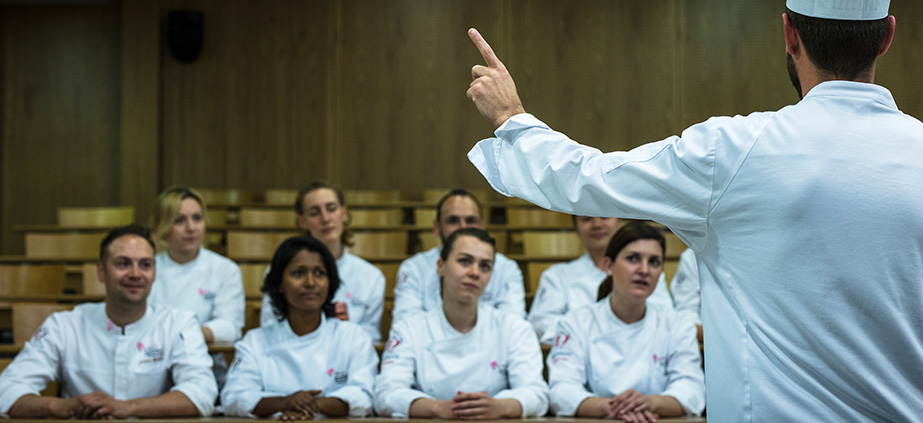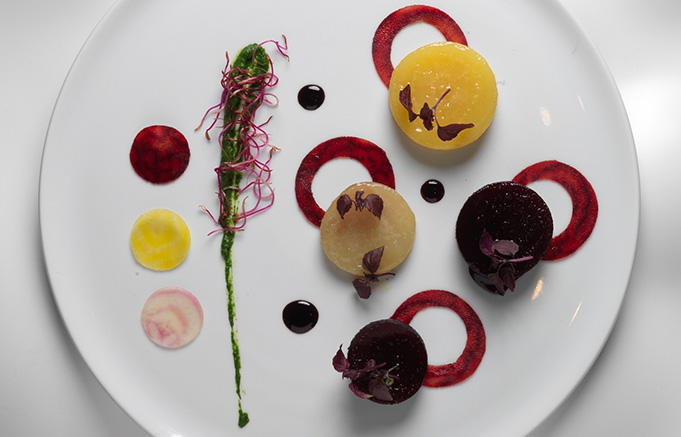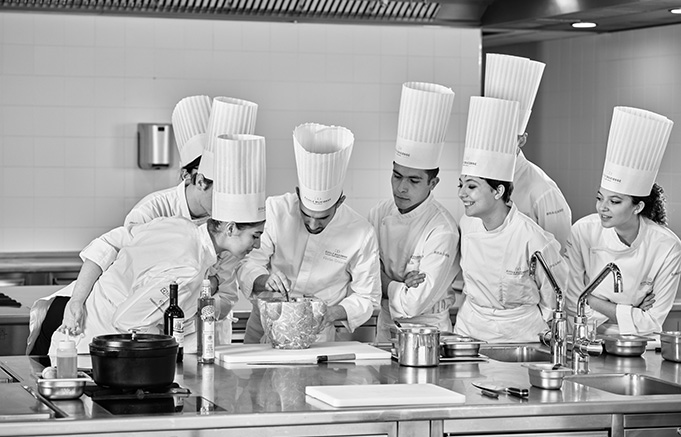How do you get into culinary school

If you’re looking to get into culinary school but don’t know where to start, here’s all you need to know.
Why go to culinary school?
Culinary school presents a unique opportunity for individuals who dream of turning their passion into a rewarding profession via a culinary arts degree. Compared to normal universities, culinary school is the ideal place to help you get started on your career. Let’s look at some of the main benefits of enrolling in culinary school.
Thorough training
Culinary school offers a comprehensive curriculum designed to equip students with the fundamental skills and knowledge needed to thrive in the culinary industry. From mastering knife techniques to understanding flavor profiles and menu development, culinary programs provide a structured approach to learning the art and science of cooking. This is essential for students who want to become head chefs or executive chefs in the future.
Proper/dedicated learning environment
Unlike traditional universities, culinary schools offer a specialized learning environment tailored specifically to the culinary arts. With state-of-the-art kitchens, professional-grade equipment, and experienced instructors, students have access to the resources needed to excel in their culinary journey. This focused setting offers a hands-on learning experience that prepares students for the realities of working in a professional kitchen.
Exposure to diverse cooking techniques
At culinary school, you'll have the opportunity to collaborate and learn alongside like-minded individuals who share your passion for food. This exposure to a diverse community of chefs-in-training allows for the exchange of ideas, techniques, and cultural influences. All serving to enrich your culinary education and broaden your culinary repertoire.
Networking opportunities
Culinary school provides a platform for students to connect with industry professionals, including chefs, restaurateurs, and culinary experts. Through internships, seminars, and networking events, students can create valuable relationships that can open doors to exciting career opportunities upon graduation. Additionally, many culinary schools have alumni networks that offer ongoing support and mentorship as students transition into their culinary careers.
Can I get into culinary school?
Entering culinary school involves a competitive process, but with the right preparation and dedication, it's certainly attainable. Here are some of the factors that contribute to the difficulty level of gaining admission.
Admission Requirements
Culinary schools typically have specific admission requirements, which may include a high school diploma or equivalent, letters of recommendation, a personal statement or essay, and sometimes relevant work experience in the culinary field. While academic qualifications are important, admissions committees also value passion, creativity, and a genuine interest in the culinary arts.
Competition for Places
Due to the popularity of cooking school and the growing interest in food-related careers, competition for places in culinary schools can be fierce. It's not uncommon for schools to receive a high volume of applications, especially for renowned programs. As such, applicants must showcase their unique skills, experiences, and enthusiasm for the culinary arts to stand out from the crowd.
Application Process
The application process for culinary school typically involves submitting an application form, transcripts, letters of recommendation, and any required essays or personal statements. Some schools may also require a culinary skills assessment or interview as part of the application process. It's essential for applicants to carefully follow instructions and ensure that all required materials are submitted on time.
Financial Considerations
Attending culinary school can be a significant financial investment, as tuition fees, housing costs, and other expenses can add up quickly. While financial aid options such as scholarships, grants, and student loans may be available, prospective students should carefully consider the cost of attendance and explore all available avenues for funding their education.
Passion and Determination
Ultimately, what sets successful applicants apart is their passion and determination to pursue a career in the culinary arts. Admissions committees are looking for individuals who demonstrate a genuine love for food, a strong work ethic, and a commitment to honing their culinary skills. By showcasing their enthusiasm and dedication, applicants can increase their chances of securing a coveted spot in culinary school.
How to apply to culinary school
Culinary school offers students a great pathway into being a professional chef as well as a wide variety of other culinary careers. If you have decided on this career path but are not sure what you have to do to get into culinary school, read on to find out how.
Check requirements
If you want to apply for Ecole Ducasse, you will need:
An identity photo
Your current CV
A copy of your passport
Letter of commitment and declaration from your financial sponsor
For a Bachelor program, a copy of your high school transcript or French Baccalaureat Diploma
International students will need certified translations of their transcripts
Note: You have to be aged 18 or older when you start your placements on the course. Students aged under 18 at the time of application will need permission from their legal guardian.
Complete the application form
Fill out the application form carefully. This includes writing a personal statement or letter of motivation to explain why you want to study this course, which is a major part of the admission process. It is vital to make sure that your application is sent before the deadline. Otherwise, you may not be able to join the course until the following year.
Pay the application fee
Some schools have an application fee. Without this, your application will not be processed. Make sure you pay this in plenty of time so that your application is considered.
Admission assessment
Your application should be reviewed within a week of receiving it. After this, you will be contacted for an admission assessment. This is usually done over video call in order to help students from all over the world have the chance to prove themselves as a good applicant.
Admission results
You should be told whether or not you have been accepted within two weeks of your assessment. If you have been successful, you will be given an offer of study. To confirm your place on the course, you will need to complete an admission package and make any pre-payments that are required. Your place in culinary school is not secured until you complete this, so be sure to handle it quickly.
Confirm your place
Once you have sent back all the required documents and pre-payments, your place will be confirmed. After this, you can use our student support for matters like visa applications, accommodation, and help getting to the campus.
When should you apply to culinary school?
When to apply to culinary school depends on what stage of life you are at, which culinary program you are considering and what your motivation is for attending.
If you are looking to apply for an undergraduate program such as a Bachelor’s in Culinary Arts or French Pastry Arts, you should undertake the application process as soon as possible to ensure you get a place, particularly if you plan to start immediately after graduating from high school.
For career switchers or graduates seeking to improve their gastronomic skills, culinary programs such as a diploma or an essentials course are shorter and run throughout the year.
The best thing is to check on the intake date for admissions onto the program you require and apply as soon as possible to avoid missing out.
Entry requirements: Is it hard to get into culinary school?
Not all culinary schools are the same and they have different general
education requirements. The qualifications you need will depend on the level of culinary degree program you are intending to study as well.

Entry requirements for culinary arts bachelors degrees
Culinary arts programs are not all about cooking and many include modules on business management, economics and marketing, so you will need to have achieved a certain level of academic education for your application to stand a chance of success.
Generally speaking, you will need a high school diploma or equivalent if you are hoping to take a Bachelor’s degree in culinary arts, though there are no subject-specific requirements.
Bachelor’s degree programs are also likely to be limited to certain age groups, although it is worth checking with each culinary school to see what these restrictions might be. At a minimum, you will need to be at least 18 years old by the end of the first semester.
Entry requirements for short programs and career switchers
Culinary schools that offer shorter diploma programs or essentials courses designed for career switchers or enthusiasts who want to hone their skills and gain some kind of classical culinary training also have a variety of entry requirements.
While again there are no subject-specific requirements, you will have to demonstrate your passion for culinary arts and be a minimum of 18 years old.
For example, the nine-week Culinary Arts Essentials course at Ecole Ducasse stipulates a minimum age and language skills as entry requirements, though no experience or degree is needed.
Is Culinary School a Good Fit for You?

Culinary school takes time, effort and financial investment, so it’s not for everyone. But if you have a true passion for culinary arts and want to reach the top, there is no better starting point than a renowned culinary arts school.
It’s the best start you can get for many reasons, including:
- Access to the expertise of highly qualified and experienced chefs who will teach you all the techniques - from classical cooking to the latest trends - in the correct way
- Internship opportunities in real restaurants - How good the restaurants are will vary depending on how well connected your culinary school is. The best ones could have you gaining hands-on experience in Michelin-starred restaurant
- A state-of-the art-learn environment where you get to practise on the latest equipment and use the best ingredients to tackle complex recipes and new, emerging food trend
- Business management tutoring - if you want to open your own restaurant, you will need to know about marketing, finance, human resources, supplier management and ingredient sourcing as well as how to cook.
- Thought leadership on the latest trends in culinary arts - those who are aiming to excel in the culinary world will need to keep abreast of the latest developments in gastronomy.
Studying at a good culinary institute is a learning experience that gives you the best possible start to your culinary career.
You can be confident you are gaining the right knowledge and skills and being trained by the best instructors to the highest standards.
You will also make food service industry connections and develop personal networks that will enable you to progress more quickly than starting at a restaurant with no experience and working your way up through the ranks.
Personality traits of a culinary arts student
So do you have what it takes to become a culinary arts student? Are you the kind of person who would benefit from a culinary arts program? And do you have the right attitude to succeed?
At the very least, you will need a passion for food, a hunger for learning about gastronomy and a strong desire to become a culinary professional. But mastering the culinary arts takes more than just passion. You will also need:
- Commitment - you have to be dedicated and prepared to put in huge amounts of time and effort to really get the most out of the program
- Creativity - the best chefs combine technique, skill and knowledge with creativity, frequently devising new recipes and experimenting with flavors to delight diners’ tastebud
- Attention to detail - working in high-end and Michelin-starred restaurants requires high-level skills and incredible precision, so you’ll have to have patience, accuracy and disciplin
- Work well under pressure - in the fast-paced environment of a professional kitchen, there is no hiding place and timing is everything, so you’ll need to be able to handle the heat!
- Stamina - it’s hard work in a kitchen and being a chef is a job that frequently requires you to do long, labor-intensive hours, so you’ll need to be resilient and physically fit.
What do you need for culinary school?
You should find out what equipment your chosen culinary school provides. Most schools will help you source some pieces of equipment, but there’s a lot that you might want to buy yourself. Even if your school has equipment for you to use, you will often find that you can get your own equipment that suits you cooking style better. Some things to think about are:
Chef's knife: Your go-to tool for chopping, slicing, and dicing. Invest in a sharp, durable chef's knife that feels comfortable in your hand.
Paring knife: Perfect for delicate tasks like peeling, trimming, and intricate cutting. Choose a small, sharp paring knife for precision work.
Cutting boards: Essential for safe and efficient food prep. Opt for a sturdy cutting board with a non-slip surface to prevent accidents.
Kitchen shears: Versatile tools for cutting herbs, trimming meats, and opening packaging. Look for stainless steel shears with comfortable handles.
Measuring tools: Accurate measurement is key in cooking and baking. Stock up on measuring cups, spoons, and a kitchen scale for precise ingredient amounts.
Mixing bowls: A set of mixing bowls in various sizes is essential for preparing and mixing ingredients. Choose durable bowls with non-slip bases.
Whisks: Ideal for blending ingredients, beating eggs, and creating emulsions. Look for sturdy whisks with thin wires and a comfortable handle.
Spatulas and cooking utensils: Essential for stirring, flipping, and serving. Invest in spatulas, spoons, tongs, and other utensils made from heat-resistant materials.
Thermometer: Ensure perfect cooking temperatures with a reliable kitchen thermometer. Choose a digital thermometer for quick and accurate readings.
Kitchen towels and aprons: Keep surfaces clean and protect your clothing with kitchen towels and aprons. Choose absorbent towels and comfortable aprons for long hours in the kitchen.
Peeler: Make quick work of peeling fruits and vegetables with a sturdy peeler. Look for one with a comfortable grip and sharp blades.
Colander: Essential for draining pasta, rinsing vegetables, and straining liquids. Opt for a durable colander with sturdy handles.
Baking sheets and pans: Equip yourself with a variety of baking sheets, pans, and molds for all your baking needs. Choose non-stick options for easy release.
Rolling pin: Perfect for rolling out dough for pastries, bread, and pasta. Look for a smooth, sturdy rolling pin with comfortable handles.
Grater: Easily grate cheese, vegetables, and spices with a reliable grater. Choose one with different grating sizes for versatility.
If you are in any doubt about what to get, you can contact the course leaders once you have accepted a place at culinary school. They will be able to help you with an equipment list, and they will often have advice on brands and types of equipment to use.

How Much Does Culinary School Cost?
The cost of a culinary education will vary according to the culinary school you choose, but it generally reflects the quality of the overall experience.
That usually means the higher the price, the more likely the school will have state-of-the-art equipment, expert faculty and great connections with the culinary industry.
All these advantages will accelerate your career, so it’s best to think of the cost as an investment in your future.
Master the culinary arts at Ecole Ducasse
Accelerate your career with a Bachelor’s in Culinary Arts from Ecole Ducasse, a school with expert faculty, Michelin-starred philosophy and unrivalled industry connections


